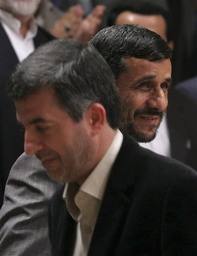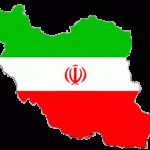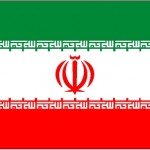Sunday
Aug292010
The Latest from Iran (29 August): The "Hidden Imam" Circle
 Sunday, August 29, 2010 at 15:09
Sunday, August 29, 2010 at 15:09  2050 GMT: Larijani v. Ahmadinejad (Foreign Policy Edition). Well, we started the day with a story of Speaker of Parliament Ali Larijani against the President, so let's close with one....
2050 GMT: Larijani v. Ahmadinejad (Foreign Policy Edition). Well, we started the day with a story of Speaker of Parliament Ali Larijani against the President, so let's close with one....On Sunday, Larijani implicitly criticised Ahmadinejad's appointment of four special representatives, including Chief of Staff Esfandiar Rahim Mashai, for foreign policy affairs, telling reporters, “I have not had the chance to ask the Foreign Ministry about the rationale behind this decision."
Larijani added to the jibe by saying that under current conditions, foreign policy issues must be dealt with more vigilantly.
Larijani is far from alone in his concern. On Saturday, Alaeddin Boroujerdi said Parliament's National Security Commission, which he chairs, is concerned over the appointment of Mashaei due to his lack of expertise and the number of posts that he holds.
The former Iranian ambassador to China and Pakistan, Javad Mansouri, has also said the appointment of inexperienced people as special envoys is “irrational”. He added that the role of the Foreign Ministry, as Iran’s ambassadors do not know whose orders they should follow.
Foreign Minister Manouchehr Mottaki, appearing on Sunday before Parliament, was caught up in heated exchanges over the issue.
NEW Iran: Ahmadinejad Attacks Rafsanjani & “Corrupt” Foes; “Overthrowers Have Not Been Punished Yet” (Kamdar)
UPDATED Iran: Tehran Declares Readiness for Nuclear Talks?
NEW Iran: An Ayatollah's "Larijani is a Jew" Declaration
Iran: Obama Rejects a Public “Red Line” on Nuclear Capability (Porter)
Iran Music Special: The Kanye West No-War Rap
The Latest from Iran (28 August): Music, Sanctions, and Science
2045 GMT: Political Prisoner Watch. Women's rights activists Maryam Bidgoli and Fatemeh Masjedi have each been given one-year sentences for “spreading propaganda against the state, through collection of signatures for changing discriminatory laws and publication of materials in support of a feminist group which works in opposition to the Regime.”
Bidgoli and Masjedi are both members of the One Million Signatures Campaign for women's rights.
1850 GMT: No Religion in the Islamic Republic? Kalemeh, the website linked to Mir Hossein Mousavi, reports that Mousavi supporters were prevented by security forces from holding a Ramadan religious ceremony in Mashhad.
1845 GMT: And the Answer Is.... You cannot imagine my excitement just now when I read the Press TV headline, "Ahmadinejad Reveals Source of All Crises".
I'm thinking Britney Spears. Or Justin Bieber. Yes, definitely Justin Bieber.
Alas, not only am I wrong but the President's answer is far more mundane: "Monarchic regimes and hegemonic powers are the source of all global crises."
1835 GMT: Political Prisoner Watch. Shohreh Taghati, the wife of imprisoned lawyer Mohammad Oliyaifard, has said her husband cannot appeal his one-year sentence --- handed down for speaking to foreign media about Iranian juveniles facing the death penalty --- because the verdict has not been formally given to him.
Oliyaifard was sentenced in February and has been in detention since March.
1830 GMT: The Gasoline Squeeze. Ali-Reza Zeighami, the managing director of the National Iranian Oil Products Refining and Distribution Company, has said Iran is about to increase its gasoline production significantly, reaching a target of 191 million litres of gasoline a day.
Iran, according to Zeighami, currently produced 45 million litres of gasoline daily, with 64 million litres being consumed. He warned that, if a gasoline rationing plan is not implemented, the consumption will increase to 100 to 120 million litres a day.
Zeighami said most of the increase in gasoline production plan will occur by the end of the Fifth Development Plan (2015).
1820 GMT: The Purge of the Universities. Minister of Science, Research and Technology Kamran Daneshjoo, who is responsible for higher education, says, "The enemies are making efforts to replace the Islamic atmosphere in [Iranian] universities with their liberal democratic environment."
Daneshjoo's remarks follow last Sunday's statement by Ayatollah Khamenei to university students in Tehran that higher education institutions have become the main "target" of plots by foreign powers.
Daneshjoo said Tehran would publish evidence proving the involvement of several foreign intelligence agencies in efforts to "negatively influence" students.
The Press TV article quoting Daneshjoo does not mention that Iranian authorities have replaced about 20 heads of higher education institutions in recent months.
1440 GMT: Parliament v. Government. Sources report to Tabnak that the impeachment effort against Minister of Energy Majid Namjoo has been halted.
1418 GMT: Protesting Executions. Footage has been posted of a protest in Washington DC yesterday, with EA's Josh Shahryar criticising the stoning of prisoners.
[youtube]http://www.youtube.com/watch?v=xrzKlAxwQ4I[/youtube]
The International Committee Against Stoning has posted reports of demonstrations in other cities around the world.
1415 GMT: Education Watch. Teachers have protested in front of the Parliament over the dismissal of 120,000 colleagues across Iran.
1410 GMT: Lots happening in Iran on both the domestic and international fronts --- we've got two new features. An update brings the latest on Iran's confused but possibly hopeful position over nuclear talks with the US, while Nazanin Kamdar reports on an apparent Ahmadinejad outburst threatening former President Hashemi Rafsanjani and "corrupt" foes.
0915 GMT: Economy Watch. Iran's Statistics Centre reports that 730,000 land labourers have lost their jobs during the last five years. Causes include no loans, no government support for purchase of harvests, and escalating imports.
0905 GMT: Political Prisoner Watch (Nokia Siemens Edition). Kaveh Shahrooz provides extensive legal background on the lawsuit filed by detained journalist Isa Saharkhiz and his son Media against Nokia Siemens Networks for selling and providing surveillance technology to Iranian authorities.
0805 GMT: Political Prisoner Watch. Persian2English reports on detained Kurdish activist Rahim Rashi, who is on Day 38 of a hunger strike.
0800 GMT: We've got a story you don't see everyday: "An Ayatollah's 'Larijani is a Jew' Declcaration".
0720 GMT: Oops! The President's Foreign Policy Guys. Khabar Online reports the first mis-step for the four special representatives appointed by the President's office this week. Hamid Baghaei, Ahmadinejad's deputy for Asia, called he mass murder of Armenians a "genocide". That caused an uproar in the Turkish media, and Foreign Minister Mottaki's explanatory phone call reportedly did not convince his Turkish counterpart Ahmet Davutoglu.
705 GMT: Too Dangerous to Remember Khomeini? For the second year in a row, Iranian authorities have cancelled all religious ceremonies for "Qadr nights" at the mausoleum of Ayatollah Khomeini, scheduled for mid-September. Clerics who normally preside include former President Mohammad Khatami, former Presidential candidate Nategh Nouri, and Hashemi Rafsanjani ally Hassan Rohani.
0635 GMT: Reconciliation? Last Sunday we were watching as President Ahmadinejad and Speaker of Parliament Ali Larijani, brought together by the Supreme Leader, declared co-operation.
This Sunday we are reading the statement of Abbas Ali Kadkhodaei, the spokesman of the Guardian Council: "We have to pray that the Government implements the Majlis' laws. The Guardian Council cannot do anything else."
Kadkhodaei added that Parliament has abided to the laws and that there has to be a resolution between the Government and Majlis within weeks. If that did not come, then the Supreme Leader had to make decisions.
MP Elyas Naderan, a leading critic of the Government, has protested that the President is trying to establish "unilateral unity". Naderan said that, as the Supreme Leader declared, unity does not mean the constant retreat of one side.
Mehr reports that an arbitration committee is trying to resolve the disputes.
0630 GMT: Khatami Intervention. Former President Mohammad Khatami has declared that a just Government cannot use its monopoly on arms to oppress its citizens and that its most important duty is to defend their rights.
0615 GMT: We start today by noting a most provocative report: Mohammad Javad Haghshenas, the manager of the Etemade Melli newspaper, raided by Iranian authorities and closed last autumn, claims there is an "Urumiyeh Circle", consisting of President Ahmadinejad and close advisors. This group all believe in and pursue policies based on the return of the 12th "hidden" Imam.
According to Haghshenas, the circle began with Ahmadinejad, key advisor Mojtaba Samareh Hashemi, and 2005 Presidential campaign manager. Later adherents include Sadegh Masouli, now Minister of Welfare, and the President's controversial Chief of Staff Esfandiar Rahim-Mashai.
Haghshenas adds that Rahim-Mashai was in the Minister of Intelligence but was dismissed because of his messianic views. He says "Ahmadinejad loves [Rahim-Mashai] more than normal and gives him multitude of offices to solidify his position as next President".
Wow, what a claim. Who could dare publish this? Surely some newspaper outside Iran, connected to the Greens, reformists, and/or Ahmadinejad's bitterest foes?
Nope. The report is featured in Khabar Online, connected to Speaker of Parliament Ali Larijani and now --- given the sweeping ban on reformist and Green media --- the effective opposition newspaper inside Iran.
tagged  Abbas Ali Kadkhodaei,
Abbas Ali Kadkhodaei,  Ahmet Davutoglu,
Ahmet Davutoglu,  Alaeddin Boroujerdi,
Alaeddin Boroujerdi,  Ali Larijani,
Ali Larijani,  Ali-Reza Zeighami,
Ali-Reza Zeighami,  Ayatollah Ali Khamenei,
Ayatollah Ali Khamenei,  Ayatollah Ruhollah Khomeini,
Ayatollah Ruhollah Khomeini,  Britney Spears,
Britney Spears,  Elyas Naderan,
Elyas Naderan,  Esfandiar Rahim-Mashai,
Esfandiar Rahim-Mashai,  Etemade Melli,
Etemade Melli,  Fatemeh Masjedi,
Fatemeh Masjedi,  Hamid Baghaei,
Hamid Baghaei,  Hassan Rohani,
Hassan Rohani,  International Committee Against Stoning,
International Committee Against Stoning,  Isa Saharkhiz,
Isa Saharkhiz,  Josh Shahryar,
Josh Shahryar,  Justin Bieber,
Justin Bieber,  Kalemeh,
Kalemeh,  Kamran Daneshjoo,
Kamran Daneshjoo,  Kaveh Shahrooz,
Kaveh Shahrooz,  Khabar Online,
Khabar Online,  Mahmoud Ahmadinejad,
Mahmoud Ahmadinejad,  Majid Namjoo,
Majid Namjoo,  Manouchehr Mottaki,
Manouchehr Mottaki,  Maryam Bidgoli,
Maryam Bidgoli,  Mehdi Saharkhiz,
Mehdi Saharkhiz,  Mehr News Agency,
Mehr News Agency,  Mir Hossein Mousavi,
Mir Hossein Mousavi,  Mohammad Javad Haghshenas,
Mohammad Javad Haghshenas,  Mohammad Khatami,
Mohammad Khatami,  Mohammad Oliyaifard,
Mohammad Oliyaifard,  Mojtaba Samareh Hashemi,
Mojtaba Samareh Hashemi,  Nategh Nouri,
Nategh Nouri,  Nokia Siemens Networks,
Nokia Siemens Networks,  Persian2English,
Persian2English,  Press TV,
Press TV,  Rahim Rashi,
Rahim Rashi,  Sadegh Mahsouli,
Sadegh Mahsouli,  Shohreh Taghati,
Shohreh Taghati,  Tabnak,
Tabnak,  Turkey,
Turkey,  Urumiyeh Circle in
Urumiyeh Circle in  Middle East & Iran
Middle East & Iran
 Abbas Ali Kadkhodaei,
Abbas Ali Kadkhodaei,  Ahmet Davutoglu,
Ahmet Davutoglu,  Alaeddin Boroujerdi,
Alaeddin Boroujerdi,  Ali Larijani,
Ali Larijani,  Ali-Reza Zeighami,
Ali-Reza Zeighami,  Ayatollah Ali Khamenei,
Ayatollah Ali Khamenei,  Ayatollah Ruhollah Khomeini,
Ayatollah Ruhollah Khomeini,  Britney Spears,
Britney Spears,  Elyas Naderan,
Elyas Naderan,  Esfandiar Rahim-Mashai,
Esfandiar Rahim-Mashai,  Etemade Melli,
Etemade Melli,  Fatemeh Masjedi,
Fatemeh Masjedi,  Hamid Baghaei,
Hamid Baghaei,  Hassan Rohani,
Hassan Rohani,  International Committee Against Stoning,
International Committee Against Stoning,  Isa Saharkhiz,
Isa Saharkhiz,  Josh Shahryar,
Josh Shahryar,  Justin Bieber,
Justin Bieber,  Kalemeh,
Kalemeh,  Kamran Daneshjoo,
Kamran Daneshjoo,  Kaveh Shahrooz,
Kaveh Shahrooz,  Khabar Online,
Khabar Online,  Mahmoud Ahmadinejad,
Mahmoud Ahmadinejad,  Majid Namjoo,
Majid Namjoo,  Manouchehr Mottaki,
Manouchehr Mottaki,  Maryam Bidgoli,
Maryam Bidgoli,  Mehdi Saharkhiz,
Mehdi Saharkhiz,  Mehr News Agency,
Mehr News Agency,  Mir Hossein Mousavi,
Mir Hossein Mousavi,  Mohammad Javad Haghshenas,
Mohammad Javad Haghshenas,  Mohammad Khatami,
Mohammad Khatami,  Mohammad Oliyaifard,
Mohammad Oliyaifard,  Mojtaba Samareh Hashemi,
Mojtaba Samareh Hashemi,  Nategh Nouri,
Nategh Nouri,  Nokia Siemens Networks,
Nokia Siemens Networks,  Persian2English,
Persian2English,  Press TV,
Press TV,  Rahim Rashi,
Rahim Rashi,  Sadegh Mahsouli,
Sadegh Mahsouli,  Shohreh Taghati,
Shohreh Taghati,  Tabnak,
Tabnak,  Turkey,
Turkey,  Urumiyeh Circle in
Urumiyeh Circle in  Middle East & Iran
Middle East & Iran 


